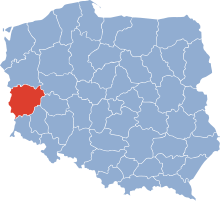The Zielona Góra Voivodeship[a] was a voivodeship (province) of the Polish People's Republic from 1975 to 1989, and the Third Republic of Poland from 1989 to 1998. Its capital was Zielona Góra, and it was centered on the southern Lubusz Land, in west-centre part of the county. It was established on 1 June 1975, from the part of the Zielona Góra Voivodeship,[1] and existed until 31 December 1998, when it was incorporated into then-established Lubusz and Greater Poland Voivodeships.[2]
| Zielona Góra Voivodeship | |||||||||||
|---|---|---|---|---|---|---|---|---|---|---|---|
| Voivodeship of the Polish People's Republic and Third Republic of Poland | |||||||||||
| 1975–1998 | |||||||||||
 The administrative subdivisions of Poland from 1975 to 1998, including the Zielona Góra Voivodeship. | |||||||||||
| Capital | Zielona Góra | ||||||||||
| Area | |||||||||||
• 1997 | 8,868 km2 (3,424 sq mi) | ||||||||||
| Population | |||||||||||
• 1975 | 580 000 | ||||||||||
• 1997 | 677 800 | ||||||||||
| Government | |||||||||||
| • Type | Voivodeship | ||||||||||
| Voivode | |||||||||||
• 1975–1980 (first) | Jan Lembas | ||||||||||
• 1997–1998 (last) | Marian Miłek | ||||||||||
| History | |||||||||||
• Established | 1 June 1975 | ||||||||||
• Disestablished | 31 December 1998 | ||||||||||
| Contained within | |||||||||||
| • Country | |||||||||||
| Political subdivisions | 57 gminas (1997) | ||||||||||
| |||||||||||
History
editThe Zielona Góra was established on 1 June 1975, as part of the administrative reform, and was one of the voivodeships (provinces) of the Polish People's Republic. It was formed from the part of the territory of the Zielona Góra Voivodeship. Its capital was located in the city of Zielona Góra.[1] In 1975, it was inhabited by 580 000 people.[3]
On 9 December 1989, the Polish People's Republic was replaced by the Third Republic of Poland.[4] In 1997, the voivodeship had a population of 677 800,[5] and in 1998, it had an area of 8,868 km2 (3,424 sq mi). It existed until 31 December 1998, when most of its territory being incorporated into then-established Lubusz Voivodeship, with some additionally being incorporated into the Greater Poland Voivodeship.[2]
Subdivisions
editIn 1997, the voivodeship was divided into 57 gminas (municipalities), including 7 urban municipalities, 21 urban-rural municipalities, and 29 rural municipalities. It had 28 cities and towns.[5]
From 1990 to 1998, it was additionally divided into six district offices, each comprising several municipalities.[6][7]
Demographics
editPopulation
edit| Year | Population |
|---|---|
| 1975[3] | 580 000 |
| 1980[8] | 609 200 |
| 1985[9] | 646 000 |
| 1990[10] | 658 700 |
| 1995[11] | 660 000 |
| 1997[5] | 677 800 |
Settlements
editIn 1997, the voivodeship had 28 cities and towns.[5] In 1998, the biggest cities and towns by population were:
Symbols
editThe voivodeship had addopped its flag and coat of arms on 18 July 1985. The coat of arms had a red Norman style escutcheon (shield) with square top and acute base. Inside the shield was featured a white (silver) eagle with elevated wings, and a green figure in a shape of the borders of the voivodeship, with two blue rivers featured on it: Oder and Lusatian Neisse. Its flag was a rectangle divided horizontally into two stripes, a yellow one on the top, and a green one on the bottom.[12]
Leaders
editThe leader of the administrative division was the voivode. Those were:
- 1975–1980: Jan Lembas;
- 1980–1982: Zbigniew Cyganik;
- 1982–1984: Walerian Mikołajczak;
- 1984–1990: Zbyszko Piwoński;
- 1990–1993: Jarosław Barańczak;
- 1993–1997: Marian Eckert;
- 1997–1998: Marian Miłek.
Citations
editNotes
editReferences
edit- ^ a b Ustawa z dnia 28 maja 1975 r. o dwustopniowym podziale administracyjnym Państwa oraz o zmianie ustawy o radach narodowych. In: 1975 Journal of the Laws, no. 16, position, 91..
- ^ a b Ustawa z dnia 24 lipca 1998 r. o wprowadzeniu zasadniczego trójstopniowego podziału terytorialnego państwa (Dz.U. z 1998 r. nr 96, poz. 603).
- ^ a b Rocznik statystyczny 1976, Warsaw: Central Statistical Office, 1976, p. 50.
- ^ Dieter Nohlen & Philip Stöver (2010) Elections in Europe: A data handbook, p1491 ISBN 978-3-8329-5609-7
- ^ a b c d Rocznik statystyczny województw 1998, Warsaw: Central Statistical Office, 1998, p. 40-41 (p. 41–42 of the PDF document).
- ^ Rozporządzenie Ministra - Szefa Urzędu Rady Ministrów z dnia 31 grudnia 1990 r. zmieniające rozporządzenie w sprawie określenia siedzib i terytorialnego zasięgu działania urzędów rejonowych.
- ^ Rozporządzenie Ministra Spraw Wewnętrznych i Administracji z dnia 8 czerwca 1998 r. zmieniające rozporządzenie w sprawie określenia siedzib i terytorialnego zasięgu działania urzędów rejonowych.
- ^ Rocznik statystyczny województw 1981, Warsaw: Central Statistical Office, 1982, p. 5 (p. 54 of the PDF document).
- ^ Encyklopedia powszechna PWN, vol. 5, Warsaw: Polish Scientific Publishers PWN, 1988, p. 318
- ^ Rocznik statystyczny województw 1991, Warsaw: Central Statistical Office, 1991, p. 15 (p. 76 of the PDF document).
- ^ Rocznik statystyczny województw 1996, Warsaw: Central Statistical Office, 1996, p. 25 (p. 94 of the PDF document).
- ^ Uchwałą Nr VIII/55/85 Wojewódzkiej Rady Narodowej w Zielonej Górze z dnia 18 lipca 1985 r. w sprawie ustanowienia herbu województwa zielonogórskiego. 18 July 1985. Zielona Góra: Zielona Góra Voivodeship Sejmik. In: 1985 Journal of the Laws of the Zielona Góra Voivodeship, no. 9, position 253. Zielona Góra: Zielona Góra Voivodeship Sejmik, 1985.

